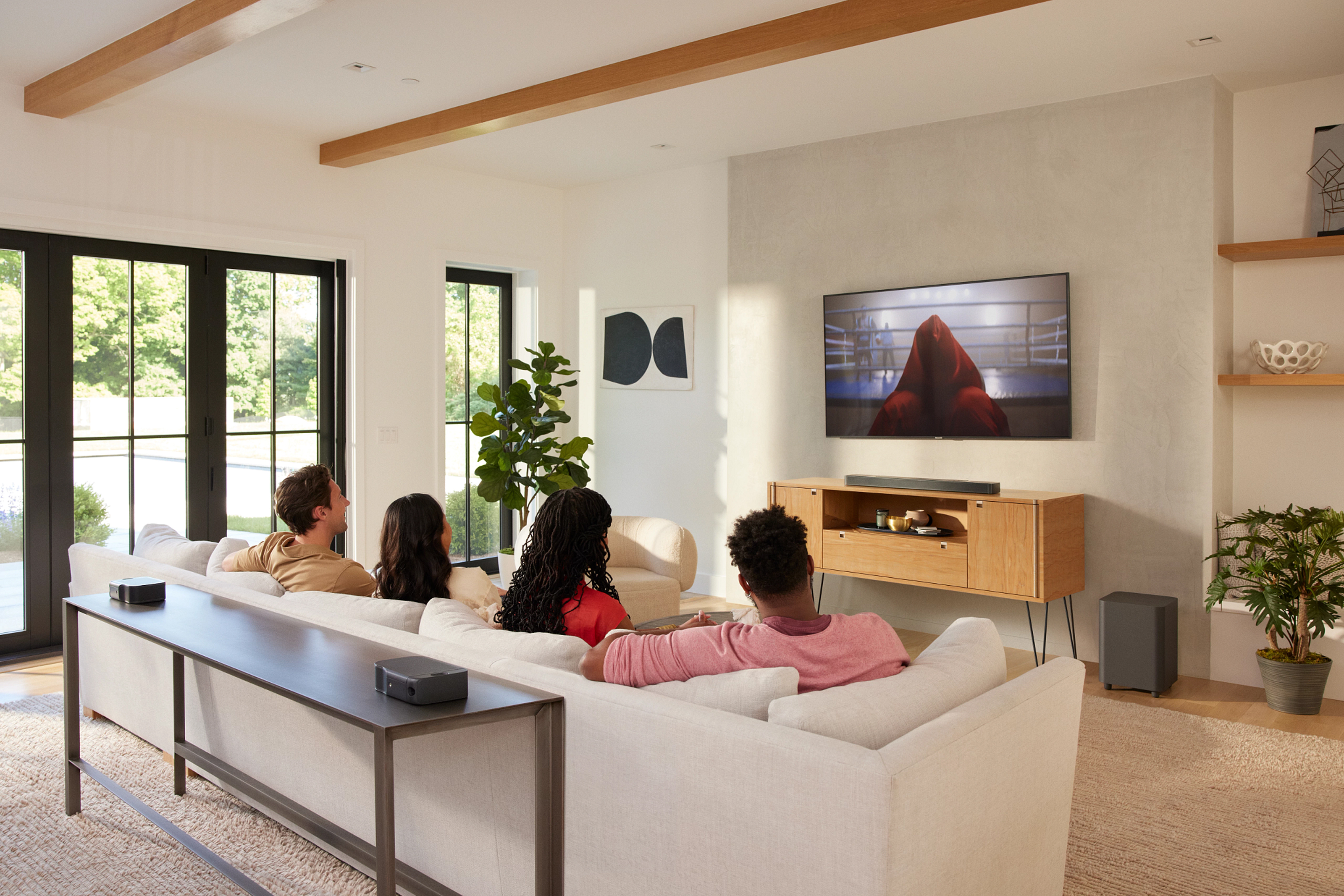Is surround sound worth it? Our expert on whether TV speakers alone are good enough
Do you need surround sound? Here are the options to take your TV experience to the next level


Is a surround sound system worth it? After all, television technology has come on in leaps and bounds in the last decade, so it follows that the built-in speakers will also have massively improved.
Well, yes and no. While it’s true that you can get reasonable sound quality from some high-end sets (Panasonic’s JZ2000 and Sony’s A90 series get honorable mentions), you’re always bumping up against two truths. One, flat screens just don’t allow for much space for chunky speaker systems unlike the CRT sets of old, and even if they did — and two — they can only imitate the best surround sound systems because they can’t offer speakers that physically surround you.
That might not be a problem. If you’re just using your TV for quiz shows, the news and the odd sitcom, then you don’t exactly need to spend hundreds of dollars on a Dolby Atmos enabled 9.2.4 surround sound system.
But if you take your TV time seriously, then improving on the built-in sound is an absolute must — especially if you find yourself reaching for the subtitles on every show. Built-in setups tend to distort the higher you turn up the volume, creating a vicious cycle where you keep needing more volume to beat the distortion — which in turn creates more distortion!
Here are some things to bear in mind when looking to upgrade.
Do you need full surround sound?
If you’re just looking to give your sound a bit more clarity and oomph, then you’re probably better off with a soundbar. The best soundbars are infinitely better than anything your TV can offer, and don’t require a great deal of space, time or technical know-how: just plug in, and away you go.
So, are soundbars better than surround sound? Not generally, as full surround sound systems, by contrast, tend to sound a lot better and offer truly immersive audio, but they can get complicated fast. If you don’t buy a pre-built ‘in-a-box’ package, then you’ll have to mix and match hardware which can be research heavy.
The Livingetc newsletters are your inside source for what’s shaping interiors now - and what’s next. Discover trend forecasts, smart style ideas, and curated shopping inspiration that brings design to life. Subscribe today and stay ahead of the curve.
But even if you do buy a ready-made solution, it still takes up a lot more space, with speakers required to physically surround the viewer. And if you don’t want unsightly wires everywhere, you may need to do some DIY (wireless options are available, but they can be flakey and sound quality won’t be as good).
As a rule, surround sound systems are more expensive too, but there is a middle ground between the two: some soundbars offer a limited version of surround sound with optional rear speakers. For me, that’s the best of both worlds, but true audiophiles will no doubt disagree.
What are the surround sound options?
If you’re dead set on true surround sound, then your next question is how fancy you want to go. You’ll quickly learn that these setups are defined by the two or three numbers divided by decimal points, such as 5.1 or 7.1. 5.1, for example, is two speakers and a subwoofer, while 7.1 is the same only with two extra speakers behind you.
More complicated setups, such as true Dolby Atmos ones, add an extra decimal point for something like 9.2.4 — that’s nine speakers surrounding you, two subwoofers and four clamped to the ceiling for audio over your head.
All things being equal, the more speakers you add (and the more you spend), the better the sound will be. But things aren’t equal, and if you’re dealing with a small space, then more speakers can actually sound worse, as the audio is muddied by their proximity. As a rule of thumb, if your room is 350 square feet or larger, then a 7.1 system or higher should be better. If it’s smaller, consider a 5.1 or lower.
- Find out more about how the best subwoofers can boost your home audio system's bass.
So is a surround system worth it?
In short, yes: a surround sound system is worth it. But it’s expensive, and it really depends on your use case. If you’re mostly watching news, sports and quiz shows, then you’re not going to benefit from surround sound in the same way as someone who plays PlayStation 5 games or unwinds by streaming the latest action blockbusters looking for that movie theater experience.
If you just want to improve on the built-in speakers that came with your TV, then emulated surround sound from a soundbar may be more than enough for you. Soundbars are generally cheaper, easier to install and offer impressive sound. But they can’t match a true surround sound setup for maximum immersion.

Freelance contributor Alan has been writing about tech for over a decade, covering phones, drones and everything in between. Previously Deputy Editor of tech site Alphr, his words are found all over the web and in the occasional magazine too. He often writes for T3 and Tom's Guide. When not weighing up the pros and cons of the latest smartwatch, you'll probably find him tackling his ever-growing games backlog. Or, more likely, playing Spelunky for the millionth time.